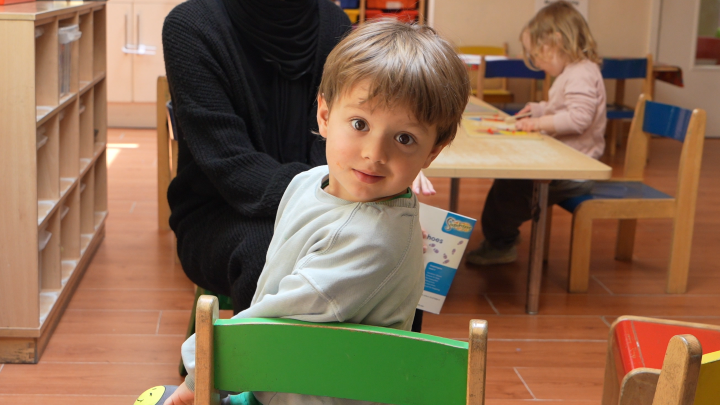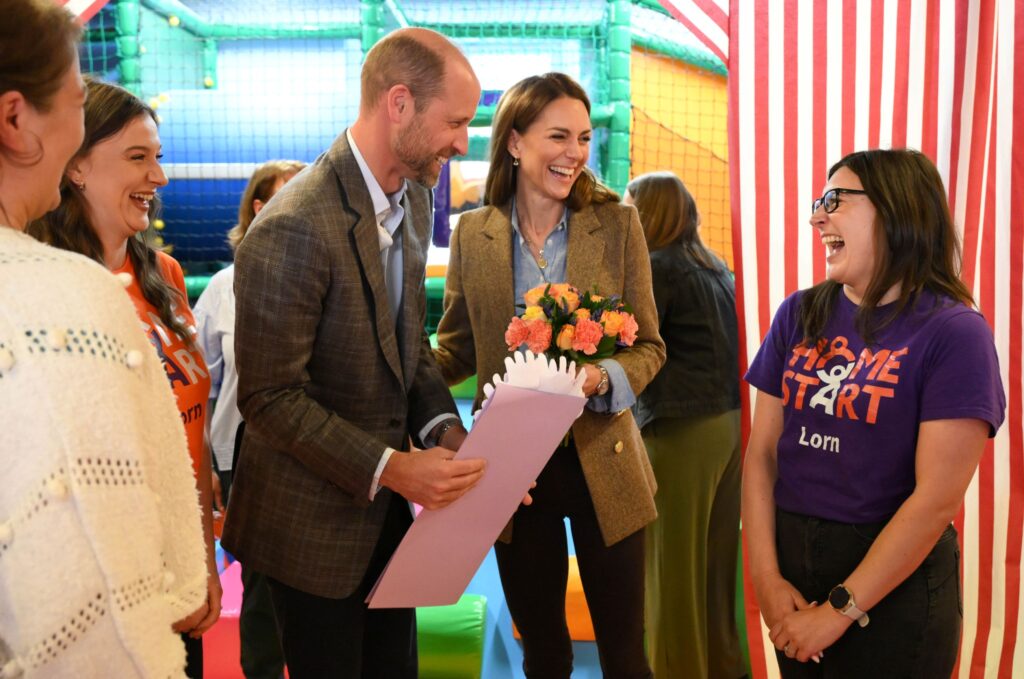“Overwhelmingly positive” results for Royal Foundation-backed early years trial as report recommends expansion to more UK health visiting teams

Health visitors involved in a trial, funded by The Royal Foundation Centre for Early Childhood, testing the feasibility of a new baby observation tool have reported an increase in their knowledge and skills in interpreting baby behaviour, and subsequently supporting parent-child interactions.
The tool, known internationally as the Alarm Distress Baby Scale (ADBB), focuses on a baby’s social behaviours such as eye contact, facial expression, vocalisation, and activity levels to help practitioners and families better understand the ways babies express their feelings.
The trial aimed to explore the feasibility of implementing the tool within routine health visiting practice in the UK to promote infant wellbeing, the social and emotional development of babies, and parent- infant relationships. This is a key time for babies, when their brains are developing faster than at any other time in their lives. Providing support at this critical time can have a life-long impact.
The findings of the trial, which was undertaken in two NHS Trusts, have been set out in an evaluation report published by The Institute of Health Visiting and The University of Oxford.
Health visitors from South Warwickshire NHS Foundation Trust and Humber Teaching NHS Foundation Trust were trained in the use of the modified and full tool to assess how babies interact with the world around them.
They then used their enhanced observation skills during appointments across a four-month period between July and November 2023.
Practitioners felt that the unique focus that the training places upon the baby represented an improvement on previous approaches that predominantly focused on the parents’ perspective or environmental factors.
They described the training as “hugely beneficial” and “of great importance” to their practice. They also reported that the new training and tool, which required minimal additional time and could be embedded into routine activities, enabled them:
- To have more meaningful conversations with parents and carers about the emotional wellbeing of their baby;
- To promote positive parent-infant interactions, attachment, and bonding; and
- To identify those babies and families in need of greater support during this critical period of development.
In light of the positive outcomes reported in the trial, the report recommends the research should move to a second phase, offering an evaluation of the training in more sites and broadening it to other areas across the UK.
“The quality of the relationships between babies and their parents or carers, during the first weeks and months of life, shapes their developing brains and lays the foundations for their future health and wellbeing. So, it is vital that we provide families with the best possible advice and support at this crucial time.
“The results of the initial phase of testing are so encouraging. We now want to move quickly to ensure we build on this work, bringing the benefits of this model to more health visitors across the country so that, ultimately, more babies and their families get the support they need to thrive.”
The baby-centric focus of the training approach can support parents and carers with bonding and attachment, whilst also helping to identify sustained social withdrawal as a sign of psychological distress – enabling specialist support to be accessed as soon as it is needed.
During the time the trial was taking place, the health visitors involved in the trial identified behavioural concerns in 23 (10%) babies as a result of using the tool. All identified families were subsequently offered additional support, which ranged from follow-up visits, emotional wellbeing visits and video interaction guidance, as well as connections to Child and Family Centres and referrals to Specialist Perinatal Mental Health and other support services.
“Babies are born with amazing social abilities. They are ready to relate and engage with the world around them, communicating how they feel through their behaviours.
“Whereas previous approaches have focused on the parents’ perspective, this training has really helped health visitors to ‘read’ the baby during interactions and develop greater sensitivity in terms of the observation of potential attachment and bonding issues that would not have been identified without the training.
“The feedback from those involved has been over-whelming positive. It is truly exciting to think about impact this could have on families right across the country as we enter the next phase of this research.”
The importance of social and emotional development in the first five years of life, is a significant area of interest for The Centre for Early Childhood and this trial is part of its wider work to promote this aspect of child development.
To help give social and emotional skills the greater priority they deserve, last year The Royal Foundation Centre for Early Childhood conducted a first-of-its-kind global listening exercise to identify the skills in this area that matter most throughout our lives. There was a consensus amongst experts around a set of skills relating to knowing ourselves, managing our emotions, focusing our thoughts, communicating with others, nurturing our relationships, and exploring the world.
Healthy development of these core skills is not inevitable – they must be nurtured from our earliest moments of life. The foundations for these skills are laid in early childhood, between pregnancy and the age of five, which is why those earliest years represent such a golden opportunity to make a difference right from the start and why supporting babies and their families during this time, is so vital.



